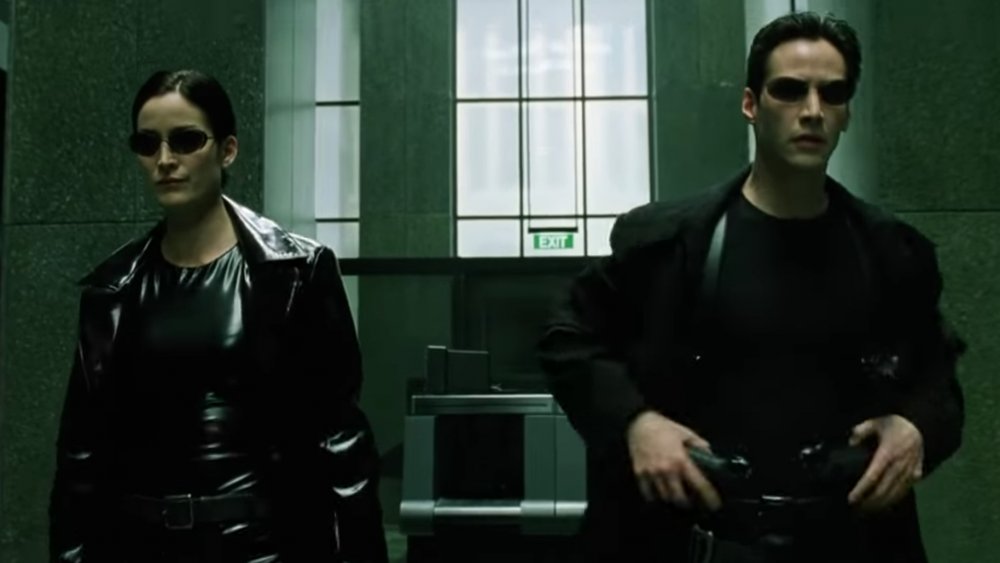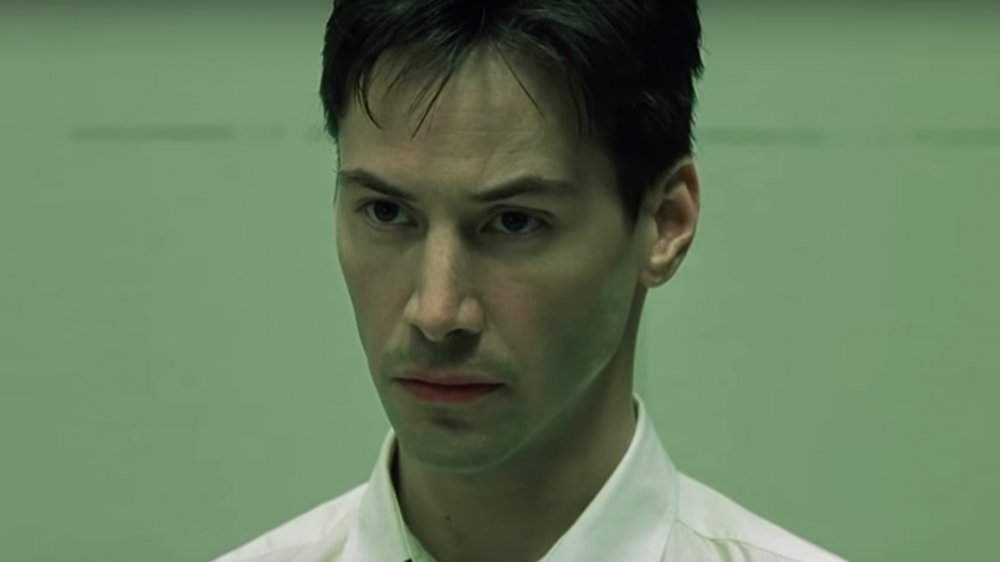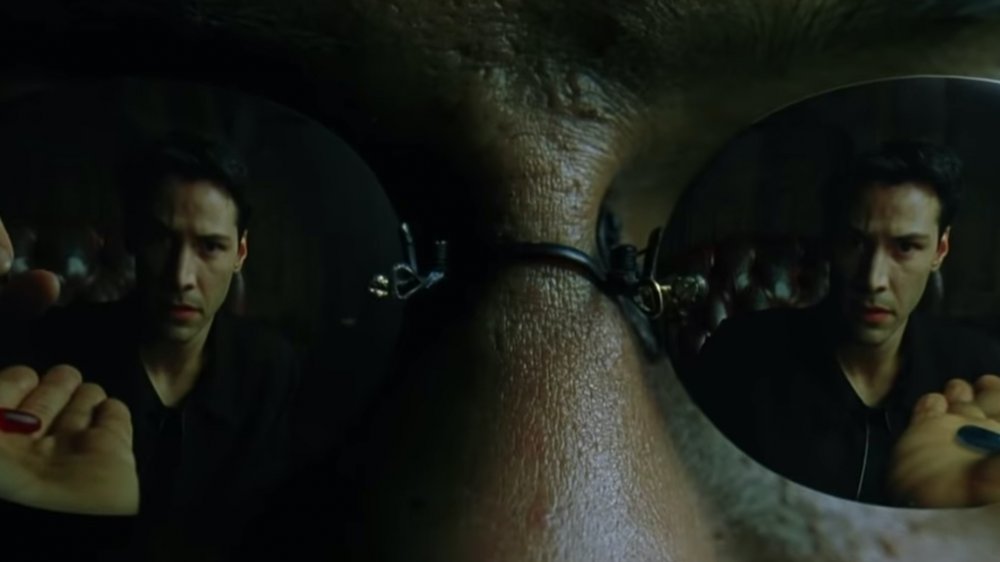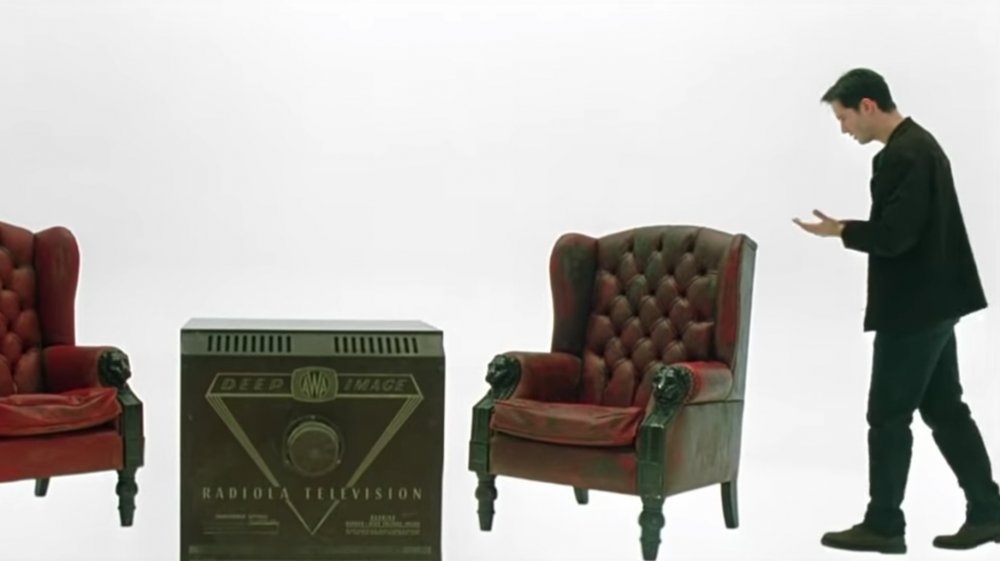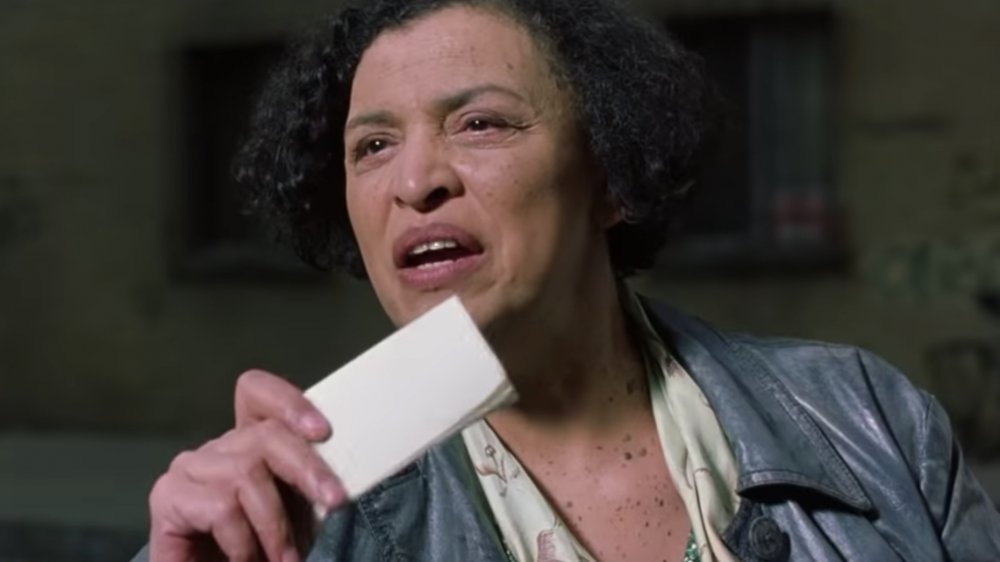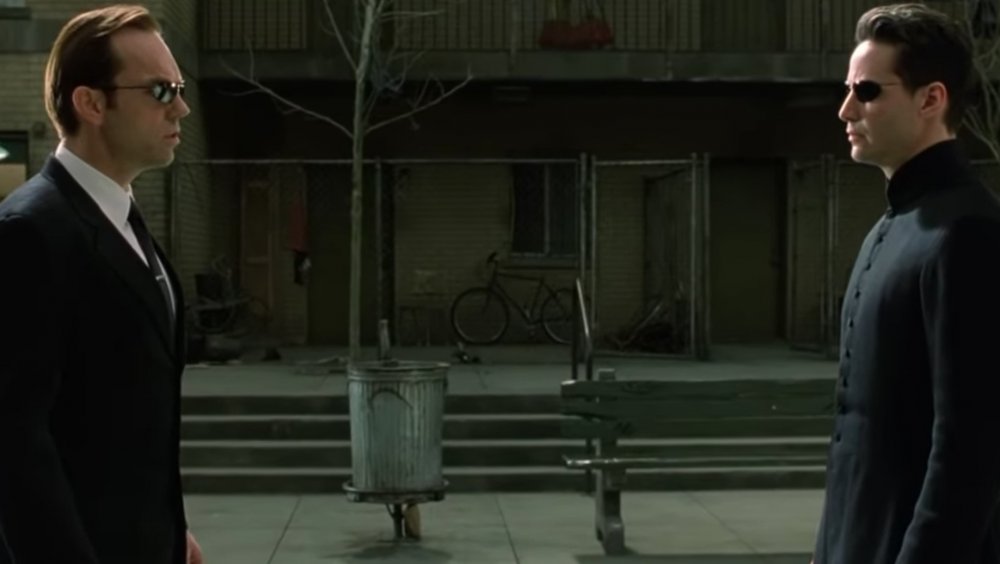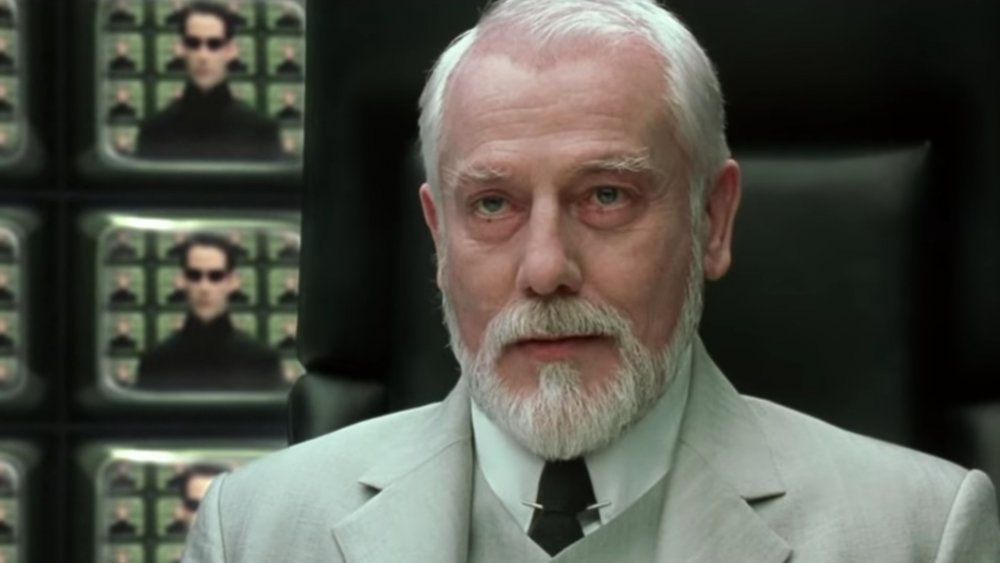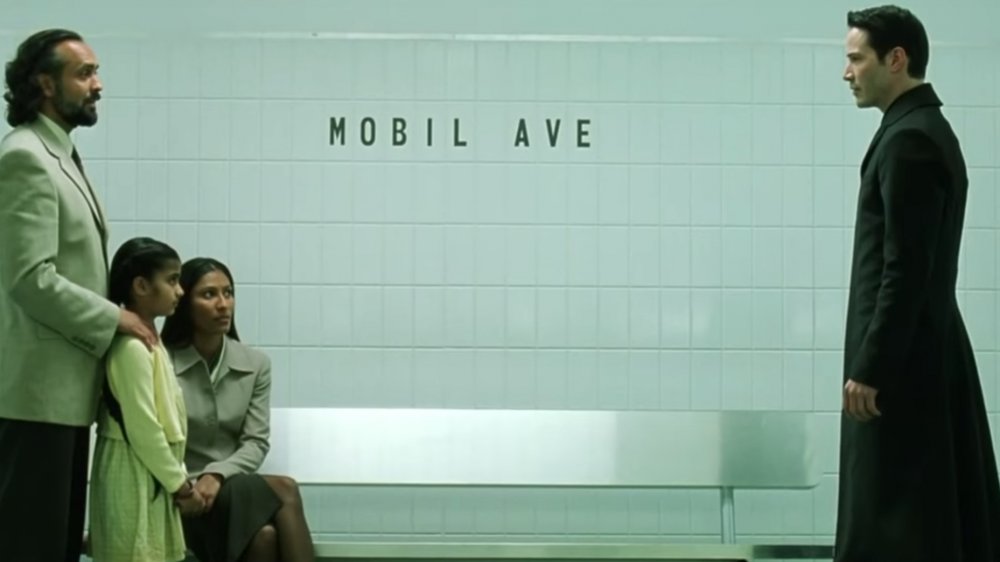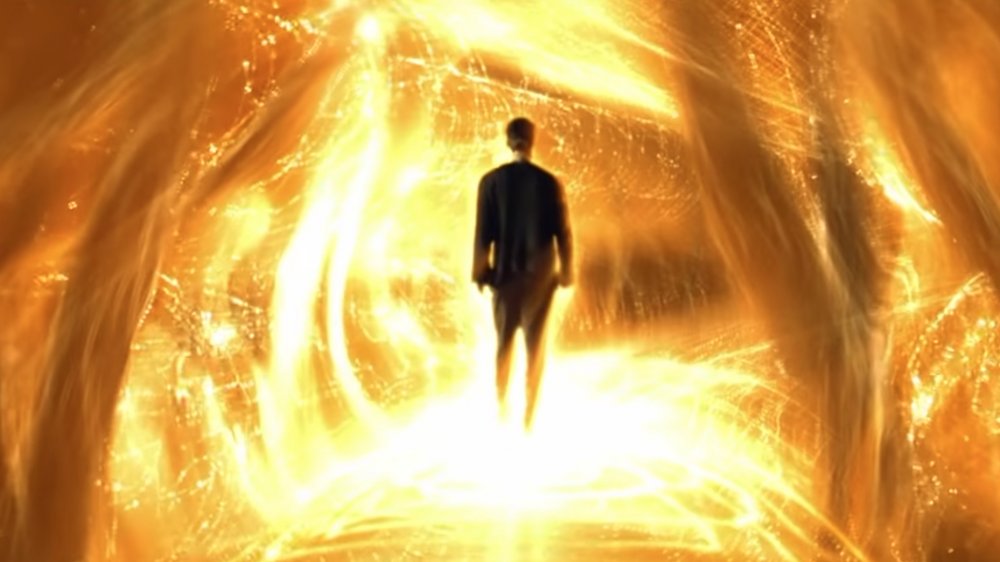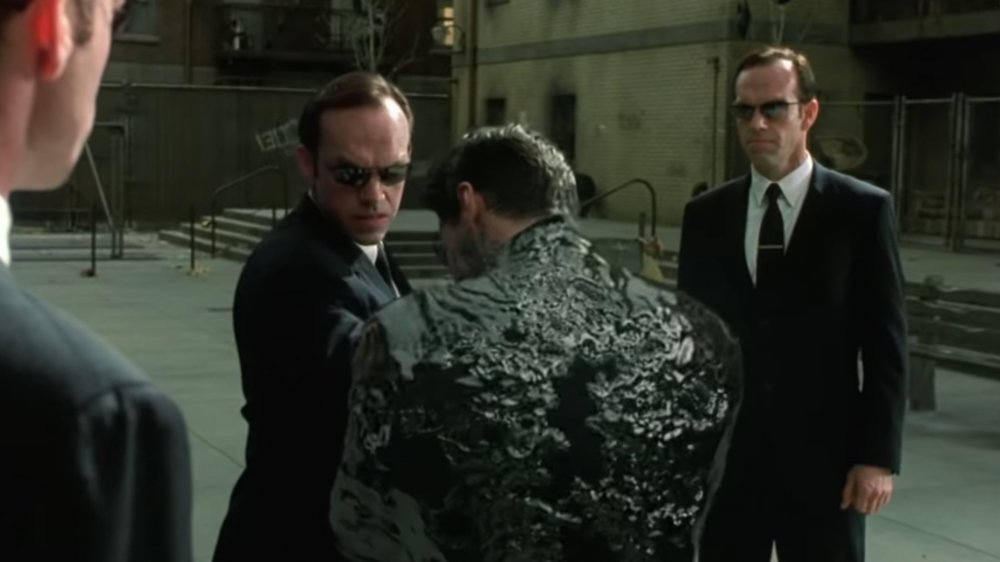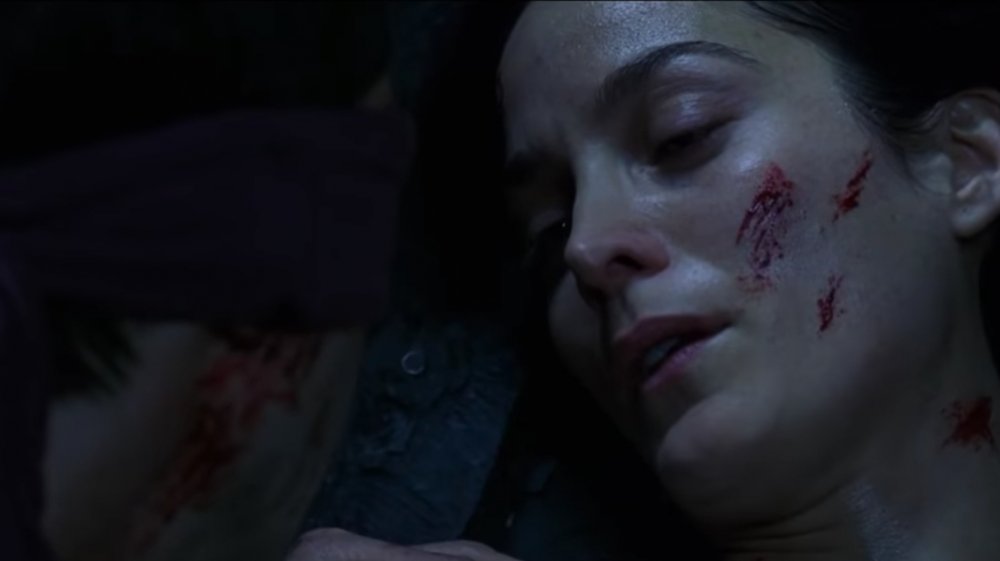The Biggest Mistakes Neo Has Made In The Matrix Series
A lot of time has passed since fans last saw Neo, hero of The Matrix series. Now that The Matrix 4 is officially happening, it's fair to assume he'll be back. As "The One," a figure of destined power within The Matrix's computer-generated reality, Neo has saved the world, slain the bad guys, and looked sleek doing it. He's seen through authoritative lies. He's experienced abilities ranging from telekinesis to clairvoyance. He's pulled off sunglasses indoors. Fans worldwide are thrilled to have more black-leather-clad adventures to look forward to — and as many debates about whether or not we're all living within a simulation as they can stomach.
Though Neo's a hero, however, he's not perfect. In fact, he's made some utterly catastrophic mistakes, miscalculations, and massive missteps over the course of the Matrix franchise. Whether small, big, or cataclysmic, here are some of the biggest mistakes Neo has made in The Matrix series.
Not taking the agents' deal
In the first leg of the trilogy, the agents give Neo one heck of a deal: If he cooperates with them and gives up Morpheus, they'll let him go back to his regular life and wipe his slate clean. In response, Neo gives the agents the finger and asks for his one phone call. The agents don't take lightly to his response: They close his mouth shut with his own skin, and proceed to insert an insectoid device into his belly button.
The truth is important. And Mr. Anderson, Neo's civilian guise, along with every other average person, really is living in a simulation. But this is the first of Neo's sketchy choices, as he really doesn't know how deep the rabbit hole goes at that point, and absolutely could have angered the agents into doing something catastrophic. Sure, he's the hero and can only mess up so dramatically — but he doesn't know that!
Taking the red pill on faith
If Neo doesn't take the red pill, then the end credits roll early and there's no trilogy. That said, his reasoning for "following the white rabbit" via the red pill is ... well, there isn't much thought process behind it. Think about it: He instantly listens to his hacked computer. The computer tells him to follow the white rabbit (a tattoo on a girl) and he does. This leads him to Trinity. At that point, there's really no turning back — Neo is intrigued that these people know so much and he, quite frankly, hates his current life — and he takes the red pill once it is offered by Morpheus.
If Neo had taken the blue pill, he would have presumably returned to his life of blissful ignorance and ease. Taking the red pill means learning how corrupt the world is, and how little power he has — which is, of course, necessary. He can't become a world-saving hero without understanding the stakes. But for all that is admirable about his choice to take the red pill, he makes it on what is, fundamentally, a whim. One wonders how many online scams Neo has fallen for, given how easily he jumps into Trinity and Morpheus' world.
Blindly trusting Morpheus
Neo doesn't just take the red pill on little more than a wish. He continuously follows other people's beliefs, paths, and advice — even when he barely knows them.
There are plenty of reasons for Neo to believe Morpheus, of course, and the story vindicates him. But he really should be more concerned about, well, everything. He finds out his entire life is a lie and he doesn't have free will. He should ask Morpheus some questions! He should do a little digging of his own! Morpheus shows and tells Neo what he wants to hear — that he's been living in a simulation his entire life — but it's pure luck that it's according to his own admirable aims. Neo bounces around from one person's opinion to the next, killing for the sake of people who are, essentially strangers. He's less a hero than a human pinball, launched by exterior forces beyond his control. That's one way to wreck a computer simultation, but it's a dangerous way to live one's life — especially in a world where deceit is the order of the day.
Continuously following other people's beliefs
Neo instantly believes the Oracle when she tells him that he's not the One. That makes Morpheus wrong, who, if you'll recall, just asked Neo to uproot his entire life for the sake of his beliefs. Neo's gullibility is on full display — and his inability to form his own beliefs.
But this isn't a one-time problem. Neo continues to follow other people's paths, despite their flaws. The Oracle tells Neo that he has to choose who's going to die between him and Morpheus. Neo, of course, saves Morpheus, making the Oracle, another person Neo blindly trusts upon meeting for the first time, wrong. She also lies about him not being The One, in order to light a fire under him, forcing him to believe in something. He ends up believing in Morpheus, and by extension, himself. But Neo, please, for the sake of your own self-preservation, become a little more skeptical about mysterious knowledge spouted by strangers.
Setting Agent Smith free
The Matrix is complicated by the fact that everything Neo (and everyone else, for that matter) does is predetermined. No matter what he decides to do, he already did it, because his path was already mapped out.
Things get even more complicated when Neo's existence as "The One" is factored in. Neo is killed by Agent Smith, but because the first Matrix covers its simulated tracks, his death needed to happen for Neo to become The One. He dies, then comes back to life, fully embracing his destiny. This is made evident when Neo stops bullets and sees in code. He also steals a play out of a ghost's playbook by jumping inside Agent Smith and then exploding him. This is cool, but also turns out to be a mistake.
We come to find out that this act sets Agent Smith free, making him a lethal computer virus who can multiply. Other agents, in comparison, can only occupy one vessel at a time. Agent Smith is now able to take over the entire Matrix. This becomes a temporary solution when Neo makes a deal to destroy Agent Smith, leading to a treaty that ends the Machine War — but really, that was just luck. Smith could have easily destroyed everything, all because Neo blew him up.
Choosing the wrong door
Neo decides to pick the door that leads to Trinity in an effort to save her, even though the Architect (the creator of the Matrix, but still a program himself) says the door would lead to humanity, including Trinity, becoming extinct. That's right: Neo finally makes his own decisions, and it almost dooms the human race.
Neo, we learn, is the sixth "One," but his love for Trinity and willingness to sacrifice everything to save her makes him different from his predecessors. This leaves the future of the Matrix in doubt and also makes Neo a rogue program. Neo is expected to open the door that stabilizes the system, after all, and when he decides to open the door that saves Trinity, he goes off-script. This is heroic, romantic, and ultimately correct, but one can't help but balk at Neo's choice. He's lucky the be vindicated, but if hadn't been, he would have made one of the stupidest moves in history.
Finding himself in purgatory
The series becomes truly confusing when, out of nowhere, Neo finds himself at Mobil Ave, a virtual world controlled by the Trainman, who works for an older program called The Merovingian. Where the first movie was a success in creating a world that was controlled by computer simulation, the sequels change the rules of the game, add new variables, and otherwise scramble everything fans thought they knew about The Matrix's world.
Take Mobil Ave. Basically, Neo is in purgatory there, as he's in a world between the Matrix and Zion. Following his own path confused the system so thoroughly that it's landed him in this limbo for rogue programs. He's lucky to be able to make his way out, but it's just that — total luck. Like so many parts of Neo's story, this is one that might have led to his destruction and the derailing of his story. Fans will believe a lot for the sake of a good yarn, but this choice is part of what made The Matrix Revolutions less well-regarded than the series' first installment.
Always a follower, never a leader
Neo is The One, yet he continues to take orders like the lowliest pawn. He's not a soldier, but he acts like one, right down to the hammered-in obedience. Consider how he swaps the hierarchy of the Matrix for the hierarchy of Zion. While a power structure can be a good thing and humans need leadership, guidance, and protection, how much freedom does Neo really have in his new home? Did he really think about what he was doing, and what he would gain for it?
Morpheus ends up having to answer for Neo's actions when Neo takes off on a casual soul-searching journey. Is this foolish, selfish, and, frankly, goofy? Yes. That said, Neo's journey is one of the few independent decisions he makes during the trilogy. But it takes him a long time to go on this quest, which ultimately costs him his life ... though future Matrix installments might prove otherwise. Regardless, when Neo finally decides to stand up for himself, he does so in the riskiest possible way.
Let's talk about how much time Neo wastes
We understand Neo taking his time and trying to figure out this complicated world by going on a journey. However, his casualness leads to casualties. While he's trying to figure things out or come up with a solution, people die. Lots of people. As he lives out his own saga, ships are destroyed and Zion is attacked. And this isn't the only time Neo has wasted time the world doesn't have to spare.
Consider this: He could have told Trinity about his dream the moment it happened, as Morpheus has a better grasp and understanding of the world and what his dream could possibly mean. Yet he doesn't. Not to mention, by not telling anyone and waiting until it's too late, he ends up telling Trinity before their mission — just what the program wants. She enters the Matrix despite him saying not to, because if she doesn't, everyone dies. This decision needs to happen so Neo can be forced to choose between saving the world and saving Trinity. But for goodness' sake, Neo, consider speaking up next time.
Underestimating Agent Smith
One of the biggest mistakes Neo makes is underestimating his opponent — specifically, Agent Smith and all of his forms. Because he's The One and sees the world differently, he doesn't think he can lose. Therefore, he underestimates Agent Smith, who somehow makes it to Zion, where this version of the agent burns away Neo's eyes. That's a life-altering change that Matrix 4 Neo might have to live with, first off. But beyond that, the Agent Smith virus proceeds to consume the Matrix as a whole.
The future is already determined, but that doesn't necessarily mean Neo's decisions aren't mistakes. After all, people die and parts of Zion is destroyed. But if Agent Smith hadn't been set free, the Matrix wouldn't have needed to be saved, the machines wouldn't have made a truce with Neo, and Zion would have been destroyed. Even still, it came at the cost of Neo and Trinity's lives, and if them dying (even temporarily) isn't a mistake, then there's no meaning to that word.
